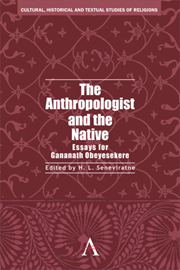Book contents
- Frontmatter
- Contents
- Editor's Note
- The Anthropologist and the Native: Essays for Gananath Obeyesekere
- SECTION I THE INDIAN TRADITION AND ITS REPRESENTATION
- SECTION II CASTE, KINSHIP, LAND AND COMMUNITY
- SECTION III RENUNCIATION AND POWER
- The Morality of Refusal
- Revolt in the Temple: Politics of a Temple Paintings Project in Sri Lanka
- Pain and Power: Reflections on Ascetic Agency
- SECTION IV BUDDHISM TRANSFORMED
- SECTION V THE ENIGMA OF THE TEXT
- SECTION VI THE ANTHROPOLOGIST AND THE NATIVE
- List of Contributors
The Morality of Refusal
from SECTION III - RENUNCIATION AND POWER
Published online by Cambridge University Press: 05 May 2012
- Frontmatter
- Contents
- Editor's Note
- The Anthropologist and the Native: Essays for Gananath Obeyesekere
- SECTION I THE INDIAN TRADITION AND ITS REPRESENTATION
- SECTION II CASTE, KINSHIP, LAND AND COMMUNITY
- SECTION III RENUNCIATION AND POWER
- The Morality of Refusal
- Revolt in the Temple: Politics of a Temple Paintings Project in Sri Lanka
- Pain and Power: Reflections on Ascetic Agency
- SECTION IV BUDDHISM TRANSFORMED
- SECTION V THE ENIGMA OF THE TEXT
- SECTION VI THE ANTHROPOLOGIST AND THE NATIVE
- List of Contributors
Summary
The Double Genealogy of Non-Violence in India
This paper begins and ends with reflection on India, and on the place of Gandhian ideas about non-violence as a form of political action. The literature on Gandhi and on his place in the study of non-violence is voluminous. One among the many questions that remain open about Gandhian thought and action is the way in which violence and non-violence are connected in his politics. The argument developed in this paper is that Gandhian ideas and practices about non-violence have a double genealogy. One genealogy is connected to Indic ideas about asceticism, avoidance, and abstinence, and in common with other ascetical traditions, relies on the moral virtues and special powers associated with the restraint of bodily appetites. The other genealogy has a different relationship to the world of the senses, of sexuality, and of power, and draws on Indic ideas about kingship, sacrifice and martial prowess. This latter tradition is not especially anxious about doing harm to sentient life and draws its ethics from the militant logics of sacrifice and warfare in Indic thought. These two genealogies themselves become blurred in the traditions of warrior asceticism in India; hence this paper also explores warrior asceticism as a living source for the politics of militant religiosity in India today.
Non-Violence As a Form of Action
Hannah Arendt's reflections (1958) on the difference between action and behavior may provide us a good beginning in thinking about the double genealogy of Gandhian non-violence.
- Type
- Chapter
- Information
- The Anthropologist and the NativeEssays for Gananath Obeyesekere, pp. 163 - 178Publisher: Anthem PressPrint publication year: 2011



